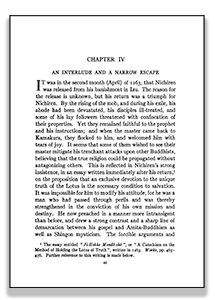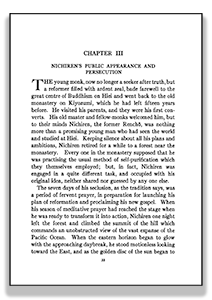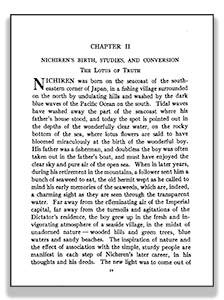The peril of the pine forest and the escape

This visit to his native place was an interlude in the perilous life of Nichiren; affectionate reminiscences of his childhood were associated with a pious desire to perpetuate these early relationships to eternity. But the interlude was destined to be interrupted; wherever Nichiren, the apostle of the Truth, went, the shadow of danger attended him. The shadow now was embodied in the person of the local chief who had tried to kill him immediately after the assembly at Kiyozumi. When Nichiren parted from the abbot and left the village convent where they had met, his adversary was waiting for him. It was early in the evening on an autumn day (the eleventh of the eleventh month 1264) that Nichiren, accompanied by a few disciples from among the monks and some believing warriors, was making his way through the gloom of a pine forest. The pursuer, with hundreds of his troops cut off the way. The danger was imminent. “Shooting arrows flew like rain drops,” Nichiren narrates, “and the sparks from clashing swords were like lightning. One of my disciples was instantly killed, two others severely wounded, and I myself received a blow (on the forehead). There seemed to be no hope of escape, but I was saved – how, I cannot explain. Thus, my gratitude toward the Lotus of Truth has ever since grown deeper.” The wound on his forehead was left to remind him of his narrow escape. The orphan boy of the warrior disciple who had died in his defense became Nichiren’s favorite disciple and served the prophet with an inherited devotion.
Although the attack seems to have been prompted by diverse motives, Nichiren saw in it a plot organized by the Amita-Buddhists. It had the effect of confirming his conviction of the falsity of Amita-Buddhism, and the truth of his own religion; and, what was far more important, of strengthening the faith of Nichiren and his followers that he was a man sent and protected by the Lord Śākyamuni, and by his Truth. The belief in his mission which had been growing since his days in Izu reached a stage in which the self-consciousness of the prophet is more explicitly proclaimed. After having told of the incident, in the letter above cited, and quoting the same passages of the scripture he cited in his writings in Izu, Nichiren tells more of himself.
“There are many in Japan who read and study the Lotus of Truth; there are, again, many who are attacked because they have conspired against others; but there is none who is abused because of (his revering) the Lotus of Truth. Thus, none of the men in Japan who hold to the Scripture have yet realized what is stated in the [Lotus Sutra] (since everyone who really holds to it must encounter perils on that account); the one who really reads it is none other than I, Nichiren, who put in practice the text, ‘We shall not care for bodily life, but do our best for the sake of the incomparable Way.’ Then I, Nichiren, am the one, supreme one, the pioneer of the Lotus of Truth.”
An Interlude and a Narrow Escape
His pugnacious spirit and his tender heart 46
His mother and his old master 47
The peril of the pine forest and the escape 49
His missionary journeys and converts 50
NICHIREN: THE BUDDHIST PROPHET


